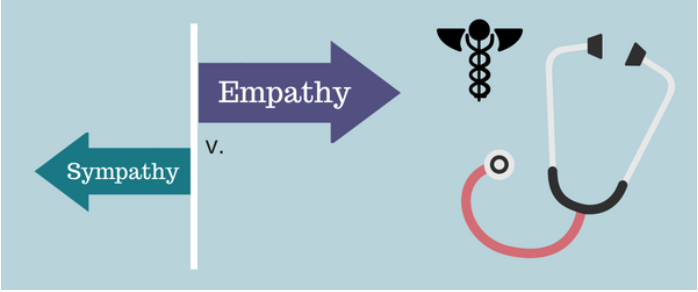What it means and why it matters.
Showing empathy in healthcare is an important driver of patient satisfaction. Communication is the key – both receiving and sharing information. As a member of the healthcare team, the quality of your communication with patients should be consistent and aim to build relationships with patients and their families. How do you walk the tightrope between managing your workload and providing high quality care? Clinical empathy plays a critical role in the answer.
What Is Empathy in Healthcare and Why Does it Matter?
A basic definition of empathy in the nurse-patient context is this: the ability of the nurse to understand how a patient is feeling. As a nurse, you should be able to listen, analyze and formulate a deliberate response when interacting with patients and their families. The most effective way to do this is to get to know the patient, his/her health history and the environmental factors that help to explain who the patient is and what he/she is going through. Empathy in healthcare matters.
What Is the Difference Between Empathy and Sympathy?

While empathy is being able to understand the emotions of a patient, sympathy refers to sharing the emotions of a patient. Be aware that sharing patients’ emotions can be counter-productive.
How Does Practicing Empathy in healthcare Benefit Patients and Nurses?
1. Increased patient satisfaction.
Patients feel valued, respected and satisfied with their care when they are shown empathy. Although the patient may be going through a stressful time, empathy from the nurse promotes a more positive environment in which trust can grow.
2. Improved patient outcomes.
When nurses treat patients with a higher degree of empathy, patient outcomes tend to be better. One study found that the patients of nurses who had attended an empathy training program “showed significantly less anxiety and hostility.”
3. More complete diagnosis.
Empathy facilitates trust. Trust between the nurse and patient is paramount in an accurate assessment, diagnosis, and treatment plan. Patients are more likely to be honest with you about their health history and lifestyle if they trust you.
4. Higher job satisfaction and career growth for nurses.
Nurses look to their employers and nurse leaders to foster engagement and professional growth. Organizational leaders who encourage empathetic and compassionate care recognize the value of a truly holistic employee. Higher nurse engagement and display of clinical empathy can reduce burn out while simultaneously promoting a positive work environment and boosting productivity.
How to Maintain Empathy in Healthcare
1. Ask for guidance.
Approach a colleague experienced in patient care who would be a willing mentor. He or she can be a sounding board for you and provide valuable feedback and practical tips for delivering compassionate care.
2. Commit to patients.
Make a personal commitment to hearing patient concerns and developing a rapport with each patient. It’s important to make patients feel valued and respected to solidify your relationship.
3. Show some emotion.
While nurses should remain level-headed and calm in high-stress situations, you are not a stone statue – you’re a person, too. Show your personality when engaging with patients and employees.
4. Refresh your interpersonal communication skills.
Verbal cues, body language and voice inflection are all elements of communication that need to be quickly translated when interacting with others before formulating a response. Taking an online refresher course is one way to help refine and polish soft skills to improve interpersonal communication.
5. Live a balanced lifestyle.
Work isn’t just work for you —it’s also your passion. Just remember to strike a balance between work and your personal life. Research suggests many benefits of establishing work life balance. Don’t give up outside activities that contribute to overall health and well-being. Go to the theatre, take a yoga class or meet with friends for dinner to socialize – it’s important to balance out the stress of work.
6. Choose wisely.
Look for organizations and nurse leaders who hire for empathy, expect empathy and build a culture around providing compassionate and empathetic care.
About Kirby Bates Associates
Kirby Bates Associates, LLC, leads healthcare organizations to achieve high quality, cost-effective patient care through a comprehensive portfolio of proven services, including Executive Search, Interim Leadership, Leadership Coaching and Operations Consulting. Contact our experts today to partner with us!

